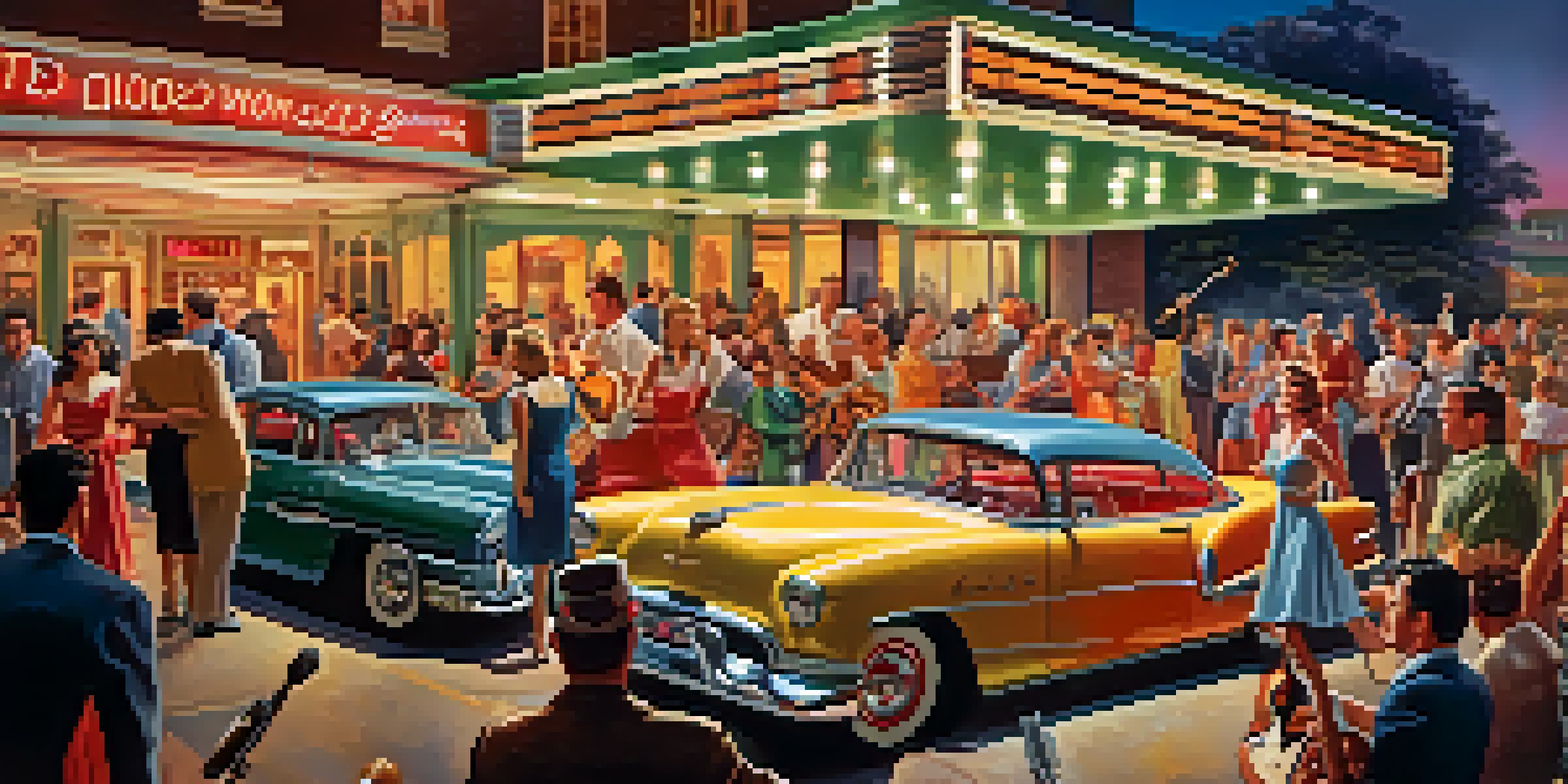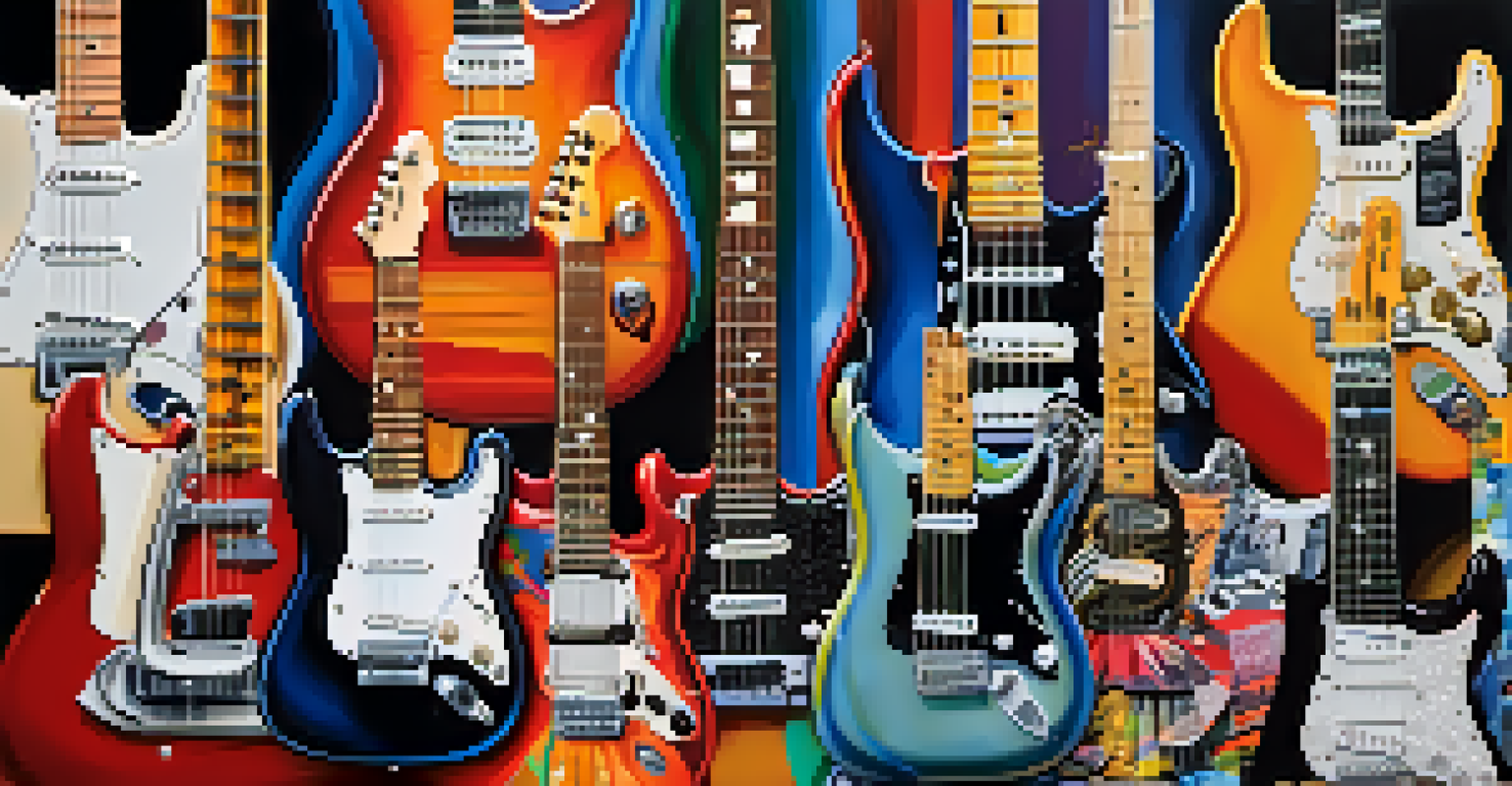Tracing Rock's Roots: The Birth of Electric Guitar Genres

The Origins of Rock and Roll: A Musical Melting Pot
Rock and roll emerged in the 1950s as a dynamic blend of various musical styles, including blues, country, and jazz. Artists like Chuck Berry and Elvis Presley played pivotal roles in popularizing this new sound, captivating audiences with their energetic performances. The electric guitar became a symbol of this genre, allowing musicians to create powerful riffs and solos that defined the music.
Rock and roll is a musical melting pot, a fusion of sounds that reflects the diverse cultures that contribute to its creation.
The influence of African American artists cannot be overstated; their contributions laid the groundwork for rock music. For instance, the blues' emotional depth and improvisational style were crucial elements that shaped rock's identity. This fusion of cultural sounds not only revolutionized music but also brought diverse communities together through shared experiences.
As rock and roll gained popularity, it sparked a cultural revolution that transcended music. The rise of youth culture in the 1960s and 70s meant that rock music became a voice for a generation, addressing social issues and personal freedom. The electric guitar, with its versatile sound, became a powerful tool for self-expression in this vibrant era.
The Birth of Electric Guitar Genres: A New Era Begins
With the foundation of rock established, the electric guitar began to branch out into various genres, each carving its unique identity. The 1960s saw the birth of subgenres like hard rock, punk, and psychedelic rock. Bands such as Led Zeppelin and The Rolling Stones pushed the boundaries of what the electric guitar could achieve, experimenting with sound and style.

Hard rock, characterized by its powerful riffs and aggressive sound, showcased the electric guitar's potential. Guitarists like Jimi Hendrix and Eric Clapton became legends, known for their technical prowess and innovative techniques. Their contributions not only influenced countless musicians but also solidified the electric guitar's status as the backbone of rock music.
Rock and Roll's Cultural Impact
Rock and roll emerged as a powerful cultural force in the 1950s, blending various musical styles to voice a generation's social issues and personal freedoms.
As the decades progressed, the electric guitar continued to evolve, giving rise to genres like heavy metal and alternative rock. Each new genre brought fresh energy and creativity, attracting diverse audiences. The electric guitar became a canvas for expression, allowing artists to explore themes ranging from rebellion to introspection.
Punk Rock: The Raw Energy of Simplicity
Emerging in the mid-1970s, punk rock was a reaction against the elaborate nature of mainstream rock music. Bands like The Ramones and Sex Pistols embraced a simple, stripped-down sound, often powered by fast tempos and catchy melodies. The electric guitar played a crucial role in this movement, delivering raw power and energy that resonated with disenchanted youth.
The electric guitar is the heart of rock music, a powerful tool for self-expression that has transformed generations.
Punk's DIY ethos encouraged aspiring musicians to pick up the electric guitar and form bands, regardless of their skill level. This accessibility democratized music, leading to a surge of underground scenes and independent labels. Punk rock emphasized attitude over technical finesse, proving that anyone could express themselves through music.
The influence of punk rock extends beyond music; it sparked a cultural movement that challenged societal norms. The electric guitar became a symbol of rebellion, with its distorted sounds echoing the frustrations of a generation. This genre's legacy continues to inspire musicians today, reminding us that authenticity and passion can triumph over perfection.
Heavy Metal: The Guitar as a Powerhouse
Heavy metal emerged in the late 1960s and 1970s, characterized by its loud, aggressive sound and complex guitar work. Bands like Black Sabbath and Iron Maiden pushed the electric guitar to new heights, utilizing distortion and intricate solos to create an unmistakable sonic experience. This genre celebrated power, both in its music and its themes.
The electric guitar became the centerpiece of heavy metal, with guitarists like Tony Iommi and Eddie Van Halen redefining what was possible. Their innovative techniques, such as tapping and harmonics, set a new standard for aspiring musicians. The guitar solos in heavy metal tracks often became the highlight, showcasing virtuosity and creativity.
Electric Guitar's Evolution
The electric guitar has continually evolved, giving rise to diverse genres like punk, heavy metal, and alternative rock, each showcasing unique expressions of creativity.
Heavy metal's cultural impact is significant, fostering a dedicated fan base and subcultures around the world. The electric guitar remains a powerful symbol of this genre, embodying the spirit of rebellion and individuality. As heavy metal continues to evolve, the guitar's role remains central, inspiring new generations of musicians to push the boundaries of sound.
Alternative Rock: Embracing Diversity and Experimentation
By the 1990s, alternative rock emerged as a diverse genre that drew influences from punk, post-punk, and indie rock. Bands like Nirvana and Radiohead showcased the electric guitar in innovative ways, blending catchy melodies with introspective lyrics. This genre opened the door for experimentation, leading to unique sounds and styles.
The electric guitar in alternative rock often featured unconventional tunings and effects, allowing artists to create atmospheric soundscapes. Guitarists like Kurt Cobain and Jonny Greenwood became known for their distinctive approaches, challenging traditional notions of guitar playing. This creativity set alternative rock apart from mainstream rock, appealing to those seeking authenticity.
Alternative rock also fostered a sense of community, with many artists supporting each other's work and sharing the stage. The electric guitar became a tool for storytelling, addressing issues like mental health and societal pressures. As the genre continues to evolve, the electric guitar remains a vital instrument, reflecting the diverse voices within the rock landscape.
The Rise of Digital Technology: New Possibilities for Guitarists
The advent of digital technology in the 21st century has transformed how musicians create and perform music. Electric guitars now come equipped with advanced features, allowing for endless possibilities in sound design. Effects pedals, software, and digital interfaces have expanded the guitarist's toolkit, enabling them to explore new sonic territories.
Digital technology has also democratized music production, making it accessible to aspiring musicians worldwide. With affordable recording software and online platforms, anyone with a guitar can share their music with a global audience. This shift has led to a resurgence of creativity, as artists experiment with genres and collaborate across borders.
Digital Technology Transforms Music
The rise of digital technology has revolutionized music creation and accessibility, allowing musicians to explore new sounds and connect with audiences globally.
Additionally, the rise of social media has allowed guitarists to connect with fans and fellow musicians like never before. Platforms like YouTube and TikTok showcase talent and trends, influencing the direction of electric guitar genres. As technology continues to evolve, the electric guitar remains a central instrument, adapting to the changing musical landscape.
The Future of Electric Guitar Genres: A Harmonious Evolution
As we look to the future, the electric guitar is poised to continue its evolution within rock and beyond. New genres are likely to emerge, blending influences from various cultures and musical styles. The guitar's adaptability ensures that it will remain a vital part of the musical landscape, inspiring generations to come.
Collaboration between artists from different genres is on the rise, leading to innovative sounds that challenge traditional definitions. The electric guitar will play a key role in these cross-genre explorations, proving its versatility and relevance. From rock-infused pop to electronic collaborations, the possibilities are limitless.

Ultimately, the electric guitar symbolizes the spirit of creativity and expression that defines music. As it continues to evolve, it will undoubtedly inspire new stories and experiences. The journey of the electric guitar is far from over, and its roots in rock will forever shape its future.